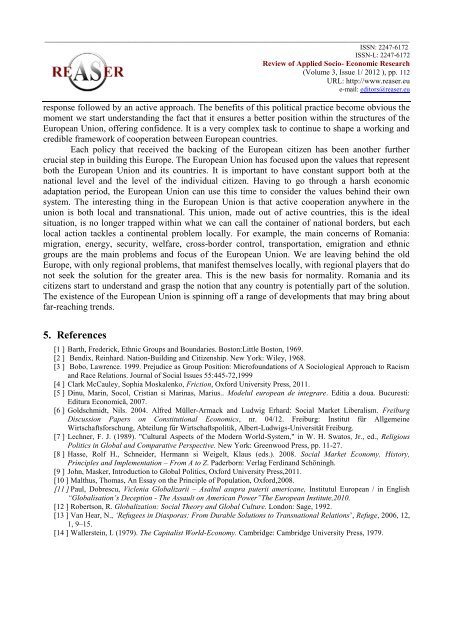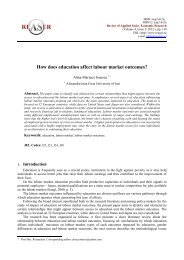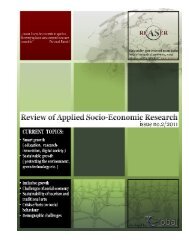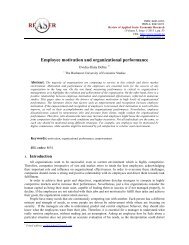Volume 3, ISSUE1/2012 - Review of Applied Socio-Economic ...
Volume 3, ISSUE1/2012 - Review of Applied Socio-Economic ...
Volume 3, ISSUE1/2012 - Review of Applied Socio-Economic ...
You also want an ePaper? Increase the reach of your titles
YUMPU automatically turns print PDFs into web optimized ePapers that Google loves.
________________________________________________________________________________________________<br />
ISSN: 2247-6172<br />
ISSN-L: 2247-6172<br />
<strong>Review</strong> <strong>of</strong> <strong>Applied</strong> <strong>Socio</strong>- <strong>Economic</strong> Research<br />
(<strong>Volume</strong> 3, Issue 1/ <strong>2012</strong> ), pp. 112<br />
URL: http://www.reaser.eu<br />
e-mail: editors@reaser.eu<br />
response followed by an active approach. The benefits <strong>of</strong> this political practice become obvious the<br />
moment we start understanding the fact that it ensures a better position within the structures <strong>of</strong> the<br />
European Union, <strong>of</strong>fering confidence. It is a very complex task to continue to shape a working and<br />
credible framework <strong>of</strong> cooperation between European countries.<br />
Each policy that received the backing <strong>of</strong> the European citizen has been another further<br />
crucial step in building this Europe. The European Union has focused upon the values that represent<br />
both the European Union and its countries. It is important to have constant support both at the<br />
national level and the level <strong>of</strong> the individual citizen. Having to go through a harsh economic<br />
adaptation period, the European Union can use this time to consider the values behind their own<br />
system. The interesting thing in the European Union is that active cooperation anywhere in the<br />
union is both local and transnational. This union, made out <strong>of</strong> active countries, this is the ideal<br />
situation, is no longer trapped within what we can call the container <strong>of</strong> national borders, but each<br />
local action tackles a continental problem locally. For example, the main concerns <strong>of</strong> Romania:<br />
migration, energy, security, welfare, cross-border control, transportation, emigration and ethnic<br />
groups are the main problems and focus <strong>of</strong> the European Union. We are leaving behind the old<br />
Europe, with only regional problems, that manifest themselves locally, with regional players that do<br />
not seek the solution for the greater area. This is the new basis for normality. Romania and its<br />
citizens start to understand and grasp the notion that any country is potentially part <strong>of</strong> the solution.<br />
The existence <strong>of</strong> the European Union is spinning <strong>of</strong>f a range <strong>of</strong> developments that may bring about<br />
far-reaching trends.<br />
5. References<br />
[1 ] Barth, Frederick, Ethnic Groups and Boundaries. Boston:Little Boston, 1969.<br />
[2 ] Bendix, Reinhard. Nation-Building and Citizenship. New York: Wiley, 1968.<br />
[3 ] Bobo, Lawrence. 1999. Prejudice as Group Position: Micr<strong>of</strong>oundations <strong>of</strong> A <strong>Socio</strong>logical Approach to Racism<br />
and Race Relations. Journal <strong>of</strong> Social Issues 55:445-72,1999<br />
[4 ] Clark McCauley, Sophia Moskalenko, Friction, Oxford University Press, 2011.<br />
[5 ] Dinu, Marin, Socol, Cristian si Marinas, Marius.. Modelul european de integrare. Editia a doua. Bucuresti:<br />
Editura <strong>Economic</strong>ă, 2007.<br />
[6 ] Goldschmidt, Nils. 2004. Alfred Müller-Armack and Ludwig Erhard: Social Market Liberalism. Freiburg<br />
Discussion Papers on Constitutional <strong>Economic</strong>s, nr. 04/12. Freiburg: Institut für Allgemeine<br />
Wirtschaftsforschung, Abteilung für Wirtschaftspolitik, Albert-Ludwigs-Universität Freiburg.<br />
[7 ] Lechner, F. J. (1989). "Cultural Aspects <strong>of</strong> the Modern World-System," in W. H. Swatos, Jr., ed., Religious<br />
Politics in Global and Comparative Perspective. New York: Greenwood Press, pp. 11-27.<br />
[8 ] Hasse, Rolf H., Schneider, Hermann si Weigelt, Klaus (eds.). 2008. Social Market Economy. History,<br />
Principles and Implementation – From A to Z. Paderborn: Verlag Ferdinand Schöningh.<br />
[9 ] John, Masker, Introduction to Global Politics, Oxford University Press,2011.<br />
[10 ] Malthus, Thomas, An Essay on the Principle <strong>of</strong> Population, Oxford,2008.<br />
[11 ] Paul, Dobrescu, Viclenia Globalizarii – Asaltul asupra puterii americane, Institutul European / in English<br />
“Globalisation’s Deception - The Assault on American Power”The European Institute,2010.<br />
[12 ] Robertson, R. Globalization: Social Theory and Global Culture. London: Sage, 1992.<br />
[13 ] Van Hear, N., ‘Refugees in Diasporas: From Durable Solutions to Transnational Relations’, Refuge, 2006, 12,<br />
1, 9–15.<br />
[14 ] Wallerstein, I. (1979). The Capitalist World-Economy. Cambridge: Cambridge University Press, 1979.








